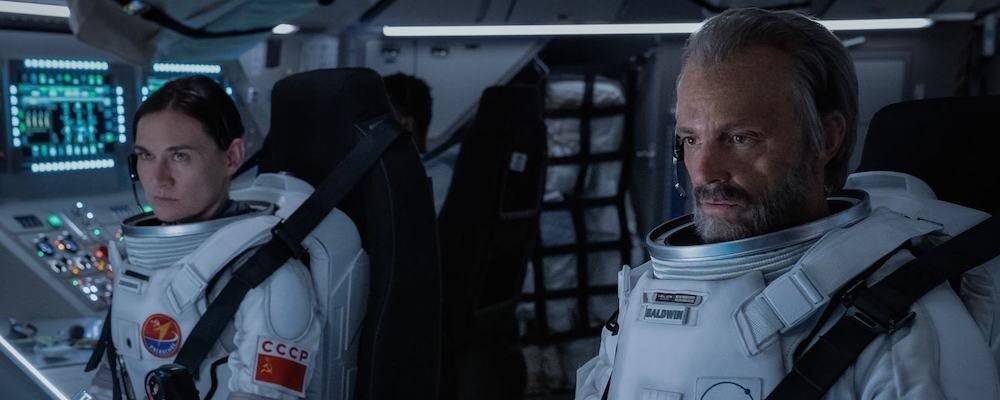‘For All Mankind’ Enters an Alternate 2003 for a Soaring Fourth Season of Speculative History
Alci Rengifo
Apple TV’s “For All Mankind” remains one of those rare shows that has not made a bad move yet. This sci-fi alternate history has found a good formula to balance its imaginative choices with believable drama. It lets the characters drive the story and not the impressive visuals. How this series has developed its own fan base is one of Apple’s better success stories when it comes to its original content. There is an undeniable, entrancing quality to the premise. Watching every new season feels like another startling glimpse of how history could indeed have turned out. What if the U.S. had seen the rise of a woman president in the ‘90s? What if the USSR lasted longer? These what ifs open the new season as it reimagines the millennium.
Following the exit of some characters last season, this one begins by updating us on the ‘90s before kicking off the narrative in 2003. The Happy Valley space station on Mars is chugging along while back on Earth grunge still happened but the Soviet Union still somehow survived Gorbachev’s reforms. Astronaut-turned-president Ellen Wilson (Jodi Balfour) is out of the picture (after conceding the 2000 election to Al Gore) but the M-7 alliance has grown with France, Japan, India, and UK joining after astronauts from the US, North Korea and the USSR proved they could work together. NASA has a new administrator as well, Eli Hobson (Daniel Stern), an automotive industry veteran who can bridge public and private interests. There’s a potential gold rush brewing with Martian asteroids and their resources. But he also has to juggle the interests of the varying M-7 countries. Ed Baldwin (Joel Kinnaman) is still around and is now the veteran XO of Happy Valley. But tragedy ensues when the ship Ranger 1 tries to secure the asteroid Kronos, setting of the season’s key arcs.
Because of its structure of decades rolling by, “For All Mankind” easily introduces new characters while carefully easing out its original cast. Now joining the lineup is Toby Kebbell as Miles, an oil rig worker who wants to provide for his family. He takes an offer from the company Helios to go to Mars, which requires a good two year commitment. Late-stage capitalism hasn’t changed in this alternate reality and once he’s on the red planet, Miles realizes he’s going to be a maintenance repairman making less than back home. Before long, he’s involved in a black market of underground dealings and the running of a bar. His partner in crime is Ilya (Dimiter D. Marinov). Tyner Rushing is also great as Samantha, a co-worker Miles gets along with who also becomes a firebrand for workers’ rights. The tension that develops is genuinely engaging and demonstrates why the show never feels the need to bury itself in the CGI or scientific jargon.
The big reveal for fans this season will be that Margo (Wrenn Schmidt) is still alive but now walking around Moscow and speaking accented Russian. She faked her own death and has apparently defected to the Soviets with intentions that remain vague early on. Still, it’s the more heartfelt sections about family and legacies that impact better than the intrigue. Ed’s grandson Danielle (Krys Marshall) was left wondering about the fate of Danny (Casey W. Johnson), but she also returns, this time headed to Mars to take back command of Happy Valley. Aleida (Coral Peña) is plagued with PTSD due to the emotional toll of last season’s terror attack on NASA headquarters. She of course believes Margo died in the attack, which adds a truly wrenching bit of tension for us viewers who know the truth. Aleida grows quite important this season when she begins partnering with Kelly Baldwin (Cynthy Wu) on a project involving Dev (Edi Gathegi), a billionaire representing how corporate interests are now firmly embedded in space exploration.
A dominant theme remains how in historical ventures, those involved on a microcosmic level struggle to do what’s right. “For All Mankind” has always boasted memorable sights in every season, but what is more compelling are the human relationships and power dynamics. Even if the Cold War had ended differently, human nature and the nature of politics would remain the same. Spanning generations, this show understands how that also means a long span of shared traumas, broken relationships and countless memories. “For All Mankind” is now only 20 years removed from where we are now, which adds to its eerie effect. Had an election or war turned out differently, had we pushed further to truly settle down in space, the world might not be the same, but our human flaws and obsessions would be intact.
“For All Mankind” season four begins streaming Nov. 10 with new episodes premiering Fridays on Apple TV+.

